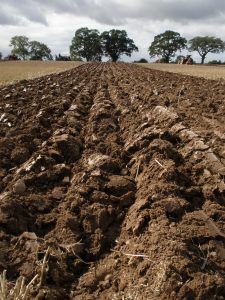Earthworms do better in soils treated with organic, manure-based fertilizers
 Photo Credit: Amanda Slater
Photo Credit: Amanda Slater
A recent study published in the scientific journal Pedobiologia explored how different conservation tilling and fertilization practices influence earthworm populations in organic farming under Mediterranean climate conditions. Earthworms play an important role in agriculture as their feeding activities improve soil structure and help evenly distribute nutrients throughout the soil profile. Conservation practices like crop rotations, reduced tillage, and the use of organic fertilizers such as farmyard and green manures can increase the overall sustainability of farms.
These researchers hypothesized that those same practices could increase the abundance and diversity of earthworms in the soil. Across a 4-year crop rotation on an organic farm in Spain, the study compared the impacts of conservation tillage using a chisel plough, where the soil is not turned over, to the more intensive mouldboard tilling method, which cuts deeply and overturns the topsoil. The tilled soil was then either fertilized with farmyard manure or left bare as a control. This fertilized or bare soil was then either treated with an application of green manure (or not) resulting in four treatments subject to each chisel or mouldboard tilling method (F+G, F-G, C+G, C-G).
The researchers found that the use of farmyard manure as an organic fertilizer was the soil management practice with the greatest positive impact on earthworms. Soils treated with farmyard manure supported more earthworms, regardless of how it was first tilled. Soil applied with green manure contained larger earthworms than soils without the application, but the number of earthworms was not affected. Overall, though other studies have shown that more intensive tilling reduces abundance and diversity of earthworms, this study did not find a strong effect of tillage. Instead, it indicates that treatment with farmyard manure as an organic fertilizer and green manure may offset any tilling effects. Incorporating these practices into organic and conventional farming can bolster earthworm communities and improve soil quality over time.



